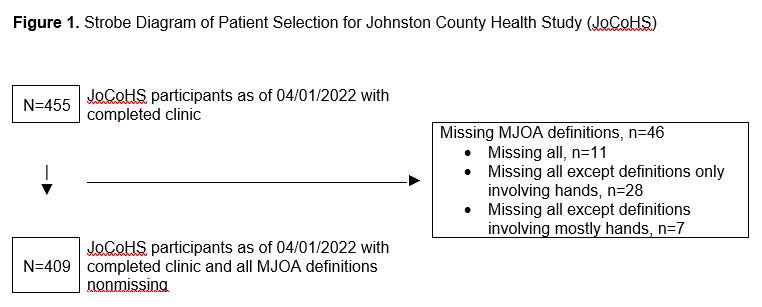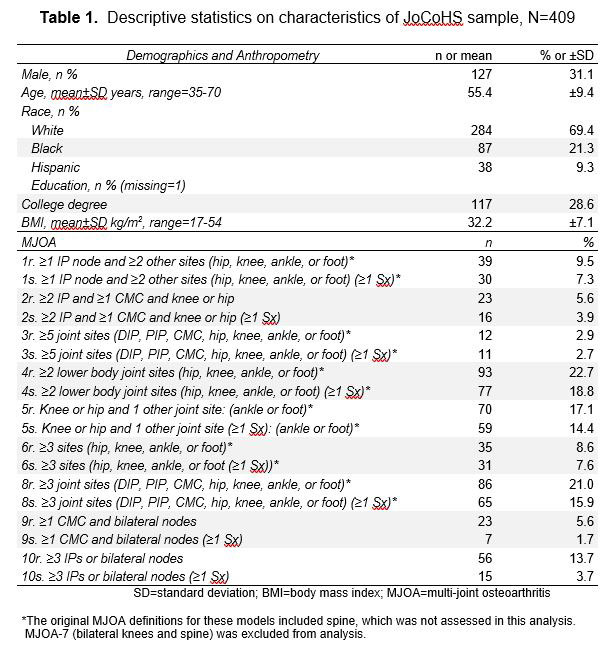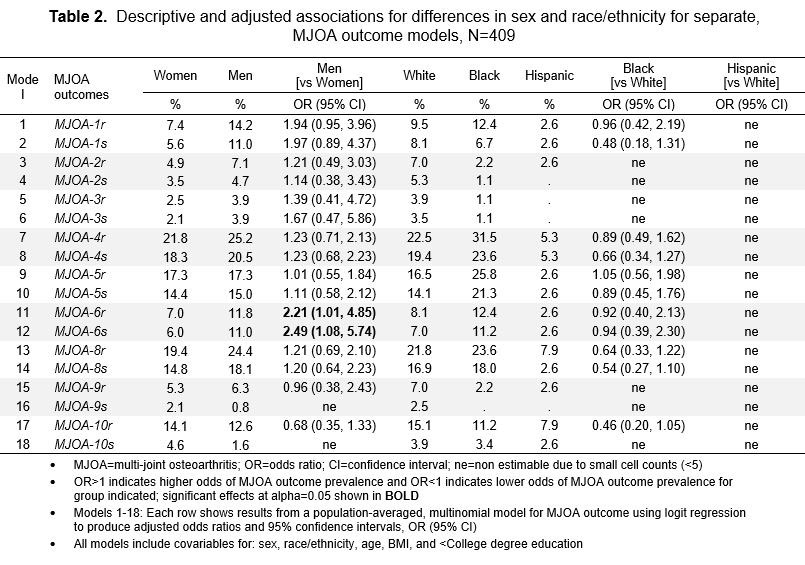Session Information
Session Type: Poster Session D
Session Time: 1:00PM-3:00PM
Background/Purpose: To describe phenotypes of multi-joint osteoarthritis (MJOA) definitions by race/ethnicity and sex in a community-based cohort.
Methods: The Johnston County Health Study (JoCoHS) is an actively enrolling population-based study of White, Black, and Hispanic men and women in Johnston County, North Carolina, built on the infrastructure of the longstanding Johnston County OA Project but with a focus on younger individuals and a range of chronic health conditions. All JoCoHS participants provide demographic information, anthropometric measurements, symptomatic and functional assessments, and radiographs of major joints (excluding spine). For this analysis, we categorized the first 455 consecutive enrolled participants according to previously established radiographic (r) and symptomatic (s) MJOA definitions (Table 1, PMID 30390991). Descriptive statistics showing frequencies and percentages by sex and race/ethnicity were produced.
Results: The first 455 participants completing clinic visits were eligible for this analysis; of these, 409 participants (69% women, 21% black, 9% Hispanic) had complete data for the phenotypes and variables of interest (Fig 1). Participants were between the ages of 35 and 70 years old with a mean age of 55 years (Table 1). Within the study population, 84% were overweight or more based on BMI ≥25 kg/m2 with a mean BMI of 32 kg/m2.
The most common MJOA phenotypes were MJOA-4r (22.7%), MJOA-8r (21.0%), and MJOA-4s (18.8%). The least common MJOA phenotypes were MJOA-9s (1.7%), MJOA-3s (2.7%), and MJOA-3r (2.9%). Table 2 shows the frequencies by sex and race/ethnicity. Small numbers preclude meaningful statistical comparisons, although it appears that men and Black participants were somewhat more likely to have several of the MJOA phenotypes.
Conclusion: The most common MJOA presentation, both radiographically and symptomatically was MJOA-4, which includes at least two lower body joint sites. This is a preliminary analysis, as the JoCoHS continues to enroll with a goal of at least 1500 participants, allowing adjusted analyses and comparisons among smaller subgroups in future work.
To cite this abstract in AMA style:
Novin S, Alvarez C, Schwartz T, Golightly Y, Nelson A. Multi-Joint Osteoarthritis Phenotypes by Race/Ethnicity and Sex: Preliminary Descriptive Data from the Johnston County Health Study [abstract]. Arthritis Rheumatol. 2022; 74 (suppl 9). https://acrabstracts.org/abstract/multi-joint-osteoarthritis-phenotypes-by-race-ethnicity-and-sex-preliminary-descriptive-data-from-the-johnston-county-health-study/. Accessed .« Back to ACR Convergence 2022
ACR Meeting Abstracts - https://acrabstracts.org/abstract/multi-joint-osteoarthritis-phenotypes-by-race-ethnicity-and-sex-preliminary-descriptive-data-from-the-johnston-county-health-study/



